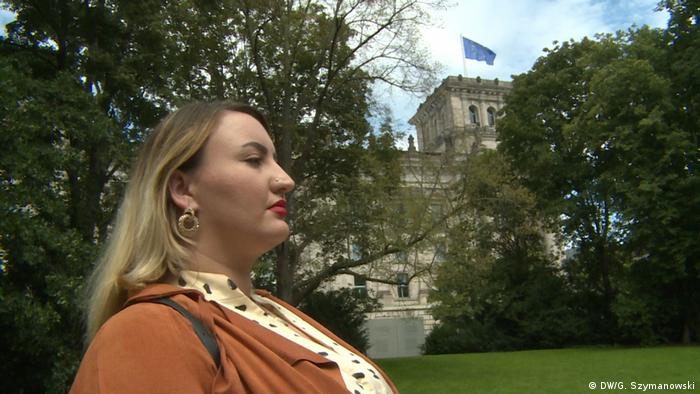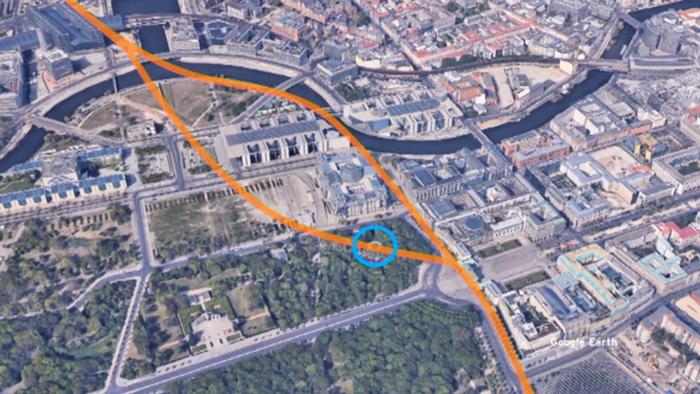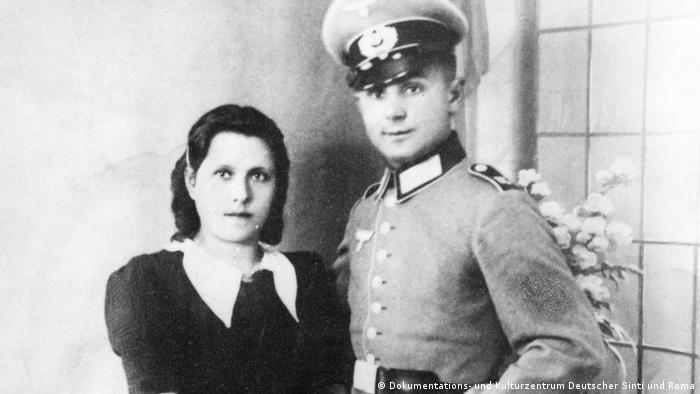Germany’s rail company, Deutsche Bahn, wants to build a suburban train line that would run under Berlin’s memorial to the Sinti and Roma murdered in the Holocaust. Activists are up in arms about the plan.

Whenever Roxanna-Lorraine Witt visits Berlin, she goes to the memorial to the murdered Sinti and Roma in Tiergarten, the city’s sprawling central park. It’s a special place for her. None of her grandmother’s five siblings survived the Nazi’s systematic murder of the Sinti and Roma.
The memorial may be under threat. Witt fears it won’t survive if a new track for the city’s commuter line gets built beneath it.
Read more: Nazis carried out mass murder of Sinti and Roma in Auschwitz
"It should be clear that this monument is sacrosanct," she said. "There is a political responsibility to protect it." That activists like her have to protest to protect it is itself a scandal, she added.

For Roxanna-Lorraine Witt the Memorial to the Sinti and Roma is a precious place
It has taken a long time for Germany to collectively remember the Sinti and Roma killed in the Holocaust.
The mass murder was called the Porajmos, meaning "devouring." Exact numbers don’t exist, but 500,000 people are estimated to have been killed. For decades, Sinti and Roma said they felt discriminated against by German authorities and overlooked as a victim group.
The German government only acknowledged the murder as a genocide in 1982.

The memorial is close to the Reichstag — a triangular stone in a circular pool representing the badges Sinti and Roma were forced to wear by the Nazis
Kept out of the loop
The memorial, just 50 meters (164 feet) from the German parliament building, was unveiled in 2012, and seen as Germany finally taking responsibility for the groups’ plight. It consists of a dark, circular pool of water upon which sits a triangular stone, which represents the badges Sinti and Roma were forced to wear in Nazi concentration camps to identify them as such.
Read more: Holocaust remembrance in Germany is a changing culture
The proximity to the government quarter poses the problem. The new rail line is set to run right through it, which may lead to the monument being dismantled.

Plans for the new train line see it run right across the Sinti and Roma Memorial
"It’s inconceivable that something would happen to this monument without speaking to us," said Romani Rose, the head of the Central Council of Sinti and Roma in Germany.
Rose has spent his life fighting for the recognition of Nazi crimes against Sinti and Roma. He’s known for leading hunger strikes in 1980 on the grounds of Dachau, the former concentration camp, to raise awareness of the Sinti and Roma role in the Holocaust.

Romani Rose is the top representative of Sinti and Roma in Germany
Deutsche Bahn reacts
A spokesman for Deutsche Bahn says the company is "totally blown away" that the impact on a memorial could be problematic, according to the Tageszeitung newspaper. Witt organized a protest against the rail construction in June.
"The memorial is a gravesite for those whose ashes are still in Auschwitz. This is a holy place not only for Sinti and Roma, but for all people," Witt said, adding she is furious that the memorial’s future could be "negotiable" in a way others are not.
Read more: Jewish memorial stones dug out and taken to construction dump
Deutsche Bahn seemed to bend to the uproar in Berlin and online. Though declining to comment to DW, a company news release said "the memorial will not be touched." It also noted that the project is only in its early stages, and a long way off from seeking actual building permission.

REMEMBERING NAZI GENOCIDE OF SINTI AND ROMA
Serving the fatherland
Many German Sinti fought for Germany not only in the First World War but also in the Wehrmacht from 1939 on. In 1941 the German high command ordered all "Gypsies and Gypsy half-breeds" to be dismissed from active military service for "racial-political reasons." Alfons Lampert and his wife Elsa were then deported to Auschwitz, where they were killed.
1234567891011
A sense of discrimination
No comments:
Post a Comment